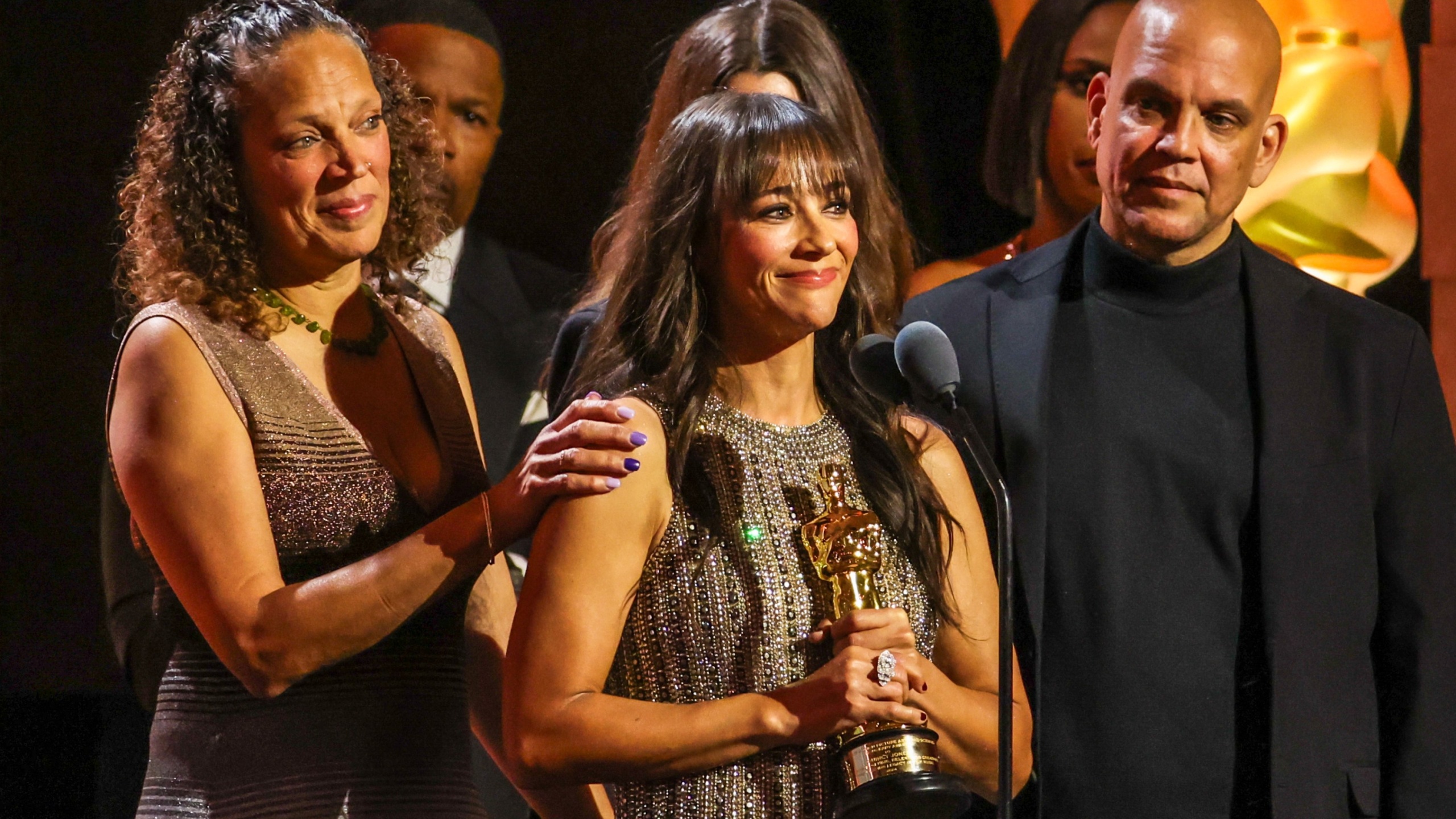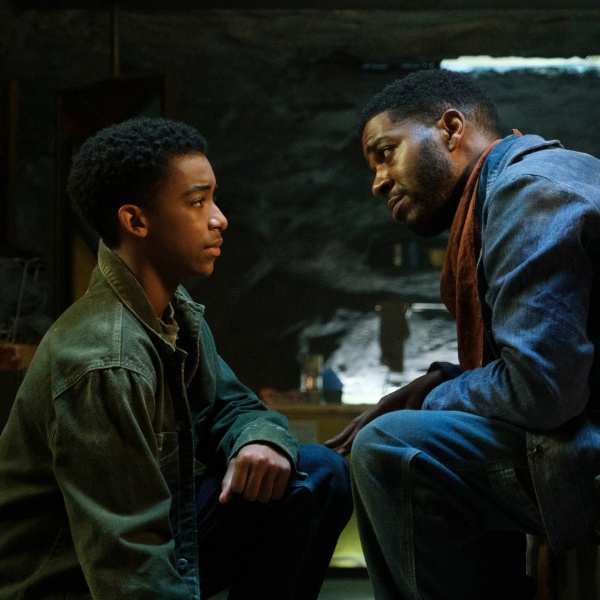The 15th annual Academy Governors Awards on Sunday night brought tears and laughs to the Ray Dolby Ballroom in Hollywood, as usual packed with Oscar hopefuls and AMPAS voters as the awards season gets into full swing.
With preparations for the March 2 Oscars (ABC) underway with two of last year’s executive producers (Raj Kapoor and Katy Mullan) and edgy new host Conan O’Brien, the Governors Awards gave out five honorary Oscars (“the Oscar for people who never made that movie good enough to win an Oscar,” joked honoree Richard Curtis) to their second casting director, New York veteran Juliet Taylor (Lynn Stalmaster was the first), presented by Nicole Kidman (“Babygirl”) who took her shoes off to meet the mic.
Other honorees included “James Bond” producers Barbara Broccoli and Michael G. Wilson, presented by bearded former Bond Daniel Craig (“Queer”); writer/director and humanitarian Richard Curtis, presented by an hilarious Hugh Grant (“Heretic”); and the late, great Quincy Jones, presented by a sincere Jamie Foxx.
Jones’ family spokesperson Rashida Jones, surrounded by three of her six siblings, brought the house to tears at night’s end. The composer and music producer died only two weeks ago, but the family wanted to honor him, and Jones read the acceptance speech he had prepared to give, excerpted below:
“I knew that creating music for film was something that I longed to do. So when the opportunity to do my first American film score for this great city of immense pawnbroker came up, it was a dream come true. From those beginnings to the present, I was always keenly aware of the enormous power that we possessed as filmmakers, that the art we created, the stories we told, if we were lucky, had a chance to move people in ways that they could never imagine, to make society and the world a more understanding and embracing place for us all to exist. We’ve come a long way in our industry, when I was a young film composer, you didn’t even see faces of color working in the studio comm series. I’m so so proud of the fact that my name and contributions can be included in that evolution.”
These awards used to be presented at the Oscars ceremony, but they demand 45 minutes of their own screen time. Now the Oscar show wedges in a montage of the untelevised off-site Governors Awards presentation.
The Governors Awards function as a black-tie starting gun to Oscar season. It also provides the Academy with a revenue-generating event as studios buy tables and pack them with that year’s Oscar-bound talent. The Oscar contenders working the room included the team behind Neon’s “Anora” (director Sean Baker and stars Mikey Madison, Mark Eydelshteyn, and Yura Borisov) and the German entry, “The Seed of the Sacred Fig” (exiled Iranian director Mohammad Rasoulof).
Paramount brought in the “Gladiator II” gang (Ridley Scott, Paul Mescal, Fred Hechinger, and Connie Nielsen) and Tim Fehlbaum’s sleeper festival success “September 5,” starring “Teacher’s Lounge” star Leonie Benesch, glammed up in style, with her cohorts John Magaro and Peter Sarsgaard.

A24 hosted “The Brutalist” director Brady Corbet and co-writer Mona Fastvold, who admitted that getting the film made was “difficult. (It stars Adrien Brody, Guy Pearce, and Felicity Jones.) “It fell apart many times,” said Fastvold. A24 picked it up after its rousing Venice debut, where Corbet won Best Director.
Focus Features’ table included “Conclave” director Edward Berger, “Piece by Piece” director Morgan Neville, and “Nosferatu” director Robert Eggers and cast Willem Dafoe, Nicholas Hoult, and Lily-Rose Depp. Hoult was also hanging with Jude Law as co-stars of Justin Kurrzel’s neo-Nazi thriller “The Order.” Hoult could also sit at the Warners table as star of Clint Eastwood’s “Juror #2,” which played well in limited release and overseas and is getting an Oscar campaign. “Dune: Part Two” director Denis Villeneuve hung with his Oscar-winning “Dune: Part One” editor Joe Walker at the Warners table.
Netflix bought three tables to accommodate their posse, including Pablo Larraín’s “Maria,” starring a singing Angelina Jolie as an aging Maria Callas; documentary “Will & Harper,” whose star Harper Steele wore a glittering evening sheath; rookie breakout Malcolm Washington’s adaptation of August Wilson’s “The Piano Lesson,” starring his brother John David and Danielle Deadwyler; and Jacques Audiard’s “Emilia Pérez,” starring Cannes actress winners Zoe Saldana, Selena Gomez, and Karla Sofía Gascón.

Searchlight supported Amy Adams in Marielle Heller’s upcoming domestic thriller “Nightbitch” as well as “A Real Pain” writer/director Jesse Eisenberg and his star Kieran Culkin, who posed for photos with Sharon Stone, who played his mother in “The Mighty.”
Mike Leigh stayed in London, but his “Hard Truths” (Bleecker Street) star Marianne Jean-Baptiste, who lives in Los Angeles, hung with Colman Domingo (A24’s “Sing Sing”). Roadside Attractions is promoting Gia Coppola’s “The Last Showgirl,” whose star Pamela Anderson wore no makeup.
At the Sony Pictures Classics’ table were co-presidents Tom Bernard and Michael Barker and Tilda Swinton (swathed in scarlet), star of Pedro Almodóvar’s Venice winner “The Room Next Door,” as well as likely Best International Feature nominee “I’m Still Here,” from Brazil’s Walter Salles. Apple TV+ supported “Blitz” director Steve McQueen with his lead Saoirse Ronan, who also represented SPC’s recovery drama “The Outrun.”
After opening remarks by Academy president Janet Yang, nattily-attired Domingo reminded attendees of our country’s tumultuous moment. “What a time to create meaningful art,” he said. “What a time to be in this room with you all. Tonight, we will inspire each other to just keep going. … We need to tell each other that what we do makes a difference in this world. We all know that movies can change minds and open hearts, and they can be a viewer to help us see ourselves, and perhaps just as important, see the lives of others. The dreamer and the optimist in me believes that films can bridge the deep divides that exists in our own nation. Let’s keep telling the most complex stories that can show us that we’re more alike than unlike.”
The first honorary Oscar of the night went to Juliet Taylor, who thanked her many directors, including James L. Brooks, Woody Allen, and the late Mike Nichols. Her inspired casting choices included Diane Keaton in “Annie Hall,” Linda Blair in “The Exorcist,” Jeff Daniels in “Terms of Endearment,” Tom Hanks in “Big,” Holly Hunter in “Broadcast News,” Owen Wilson in “Midnight in Paris,” and Beatrice Straight in “Network,” who won a supporting actress Oscar with five minutes of screen time. (The casting branch will vote for winners in a new category that will come in 2026 for films released in 2025.)

Sibling “James Bond” producers Michael G. Wilson and Barbara Broccoli, accepting the Irving Thalberg producing award, thanked their father, Albert “Cubby” Broccoli, whose Bond legacy they nurtured over 60 years and 25 films. He was awarded the Thalberg back in 1981.
Growing up with Bond, Broccoli thought “he was a real person,” she said. “There is a family feeling within the people we work with,” said Wilson. The clip reel ran through the Bonds over time, from Sean Connery, George Lazenby, Roger Moore, Timothy Dalton, Pierce Brosnan, and, most recently, Craig. A new one will be chosen soon to carry the mantle forward for a new generation.
Hugh Grant declared that “Four Weddings and a Funeral” writer Richard Curtis was the only one to resist his casting; their collaboration continued through “Notting Hill,” “Love Actually,” and the “Bridget Jones’ Diary” series.
As a director Curtis wasn’t always kind and gentle, Grant said. “Forever etched on my heart, are some of the notes he gave me, including ‘And now do a funny one’ and ‘Don’t worry, we can cut round you,’” he said. “Anyway, while all this was going on, not content with saving the British film industry, he decided he also had to try and save the whole bloody world. … I think that you and I need to do one more film before we get dragged and dropped into that great junk folder in the sky. It could be ‘Four Funerals and a Wedding.’ It could be ‘Bridget Jones’ Diaper,’ but we should do something.”

Curtis collected the Jean Herschel Humanitarian Award for his enormous contributions across the years to Comic Relief, Live Aid, the U.N.’s Sustainable Development Goals, and other charities to combat world hunger, supporting over 170 million people around the world. “I’ve just been a sort of lubricant to try and bring everyone together,” Curtis said, thanking some 56 people in the room by his count who made contributions to his causes over the years.
Curtis bewailed the demise of Participant Media and its social impact campaigns. “I will just plead with everyone here, when you make a film or a show with a powerful social message and empowering positive message like your ‘Inside Out,’ to put aside a small fraction of your budget in advance to pay for impact bridges,” he said. “When you have a daily person or team to take the film and use it for campaigning, for targeted education, for changing laws, when films get shown to the right people in power at the right time, when films are linked to the right charities, amazing things have happened under the same amount of cash that you’d spend on a few more ads. An impact producer can help your film do more than move people. It can actually save and change real lives.”

Jamie Foxx explained how Quincy Jones was more than a popular musician conversant in the gospel, pop, soul, classical, and jazz genres, and conductor/arranger/producer for Michael Jackson and more: he also composed 35 propulsive movie soundtracks, including Sidney Lumet’s “The Pawnbroker,” Norman Jewison’s “In the Heat of the Night,” and Steven Spielberg’s “The Color Purple.”
He said, “Tonight we pay tribute to him for the creativity and the brilliance he brought to cinema. So many of us in music and movies have our own special connection with Quincy. … In 1967. Quincy became the first Black composer to be nominated in the Original Song category for his work on ‘In Cold Blood.’”
The evening ended on a poignant note as four of Jones’ seven children took the podium to honor their father, who died at 91. “His music has literally defined an entire century of culture spanning genres, jazz, disco, film, pop art, we hip hop,” said Rashida Jones. “But the real thread in his music is that his music is all infused with his love. … Wherever he went, he made connections with everyone, real ones. He had his private natural gift with people. He knew how to stay present, stay curious and stay loving.”
She continued, “He really, really, really intended on being here with us tonight. And I want you to know that he is here, very much here. The music he made, that was his real legacy, love. He loved life, and he often said, live every day like it’s your last, and one day you’ll be right. And you did, Dad, you did. You lived the biggest, best, most beautiful life of love every single day you were here. So in honor of our dad, we hope you will do the same. Live with love, lead with love, bring love to everything that you do.”


